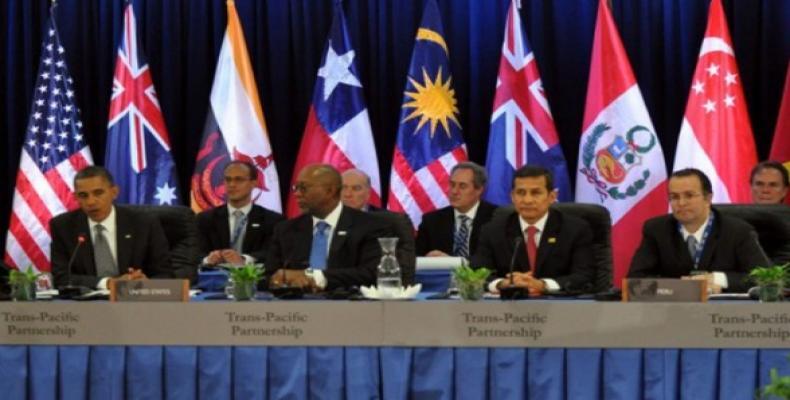Lima, March 27 (teleSUR-RHC) A new chapter of the Trans Pacific Partnership (TPP) was unveiled on Thursday by WikiLeaks to Peruvian newspaper La Republica.
The treaty has been negotiated in secret since 2010. The organization Public Citizen, which was present at the negotiations in Hawaii between March 9 and 15, verified the authenticity of the leaked document.
The 55-page chapter, dated Jan. 20 this year, shows the treaty will reinforce the mechanisms that allow transnational corporation investment in the countries to sue the state where they operate, even before attempting to go through the national mechanisms.
The chapter also specifies that companies will be able to sue the state in private courts when they lose profits, or the expectation of profits, due to social conflicts and changes in the public health or environmental codes of a nation.
It will also protect companies from direct and indirect expropriations and any changes in financial legislation. The chapter contradicts promises by Peruvian President Ollanta Humala and his U.S. counterpart Barack Obama.
According to the notes from the debate during the negotiations, only Australia refused to be ruled by the regulations in this chapter. In contrast to Peru, where there is no transparency about the negotiations, Chile has created an open forum with its citizens to find out where they stand. Chile has also included a clause that protects the right of its Central Bank to limit money transfers from and to the country.
According to the aforementioned TPP chapter, if a foreign company considers that a law passed by a government affects its rights — as recognized by the TPP — it could sue the country in the private arbitration system, the investor-state dispute settlement, or ISDS.
Public Citizen argues that this mechanism can be characterized by a lack of public accountability and transparency, as well as a conflict of interests, since most lawyers who serve in these courts also work defending the companies from lawsuits from the countries involved.
However, and in spite of the fact that there are already similar mechanisms in the free trade agreement with the U.S., what is happening needs to be revised because the attraction of investors should not reinforce or expand those mechanisms that have been generating problems to the State and interfering with the national sovereignty.”
The treaty includes 12 countries, in which the U.S. has the most powerful negotiating position considering the size of its economy. The other countries are Australia, Brunei, Canada, Chile, Japan, Malaysia, Mexico, New Zealand, Singapore, Vietnam, and Peru.
Estimates suggest the countries at the table represent a total of 40 percent of the world’s economy and that means this treaty will be the largest trade agreement ever made.


